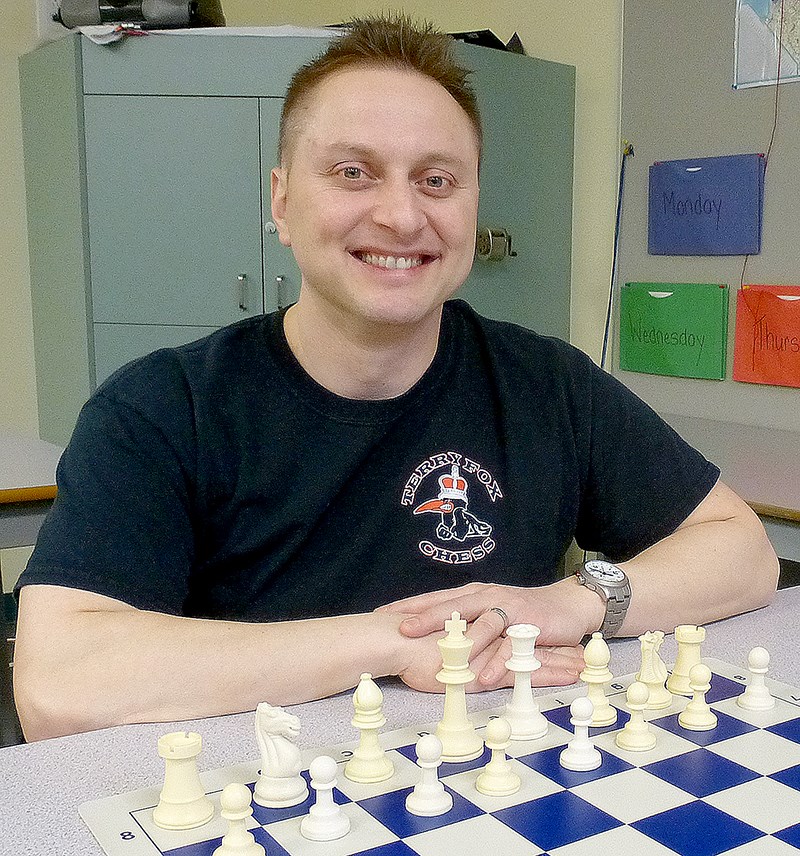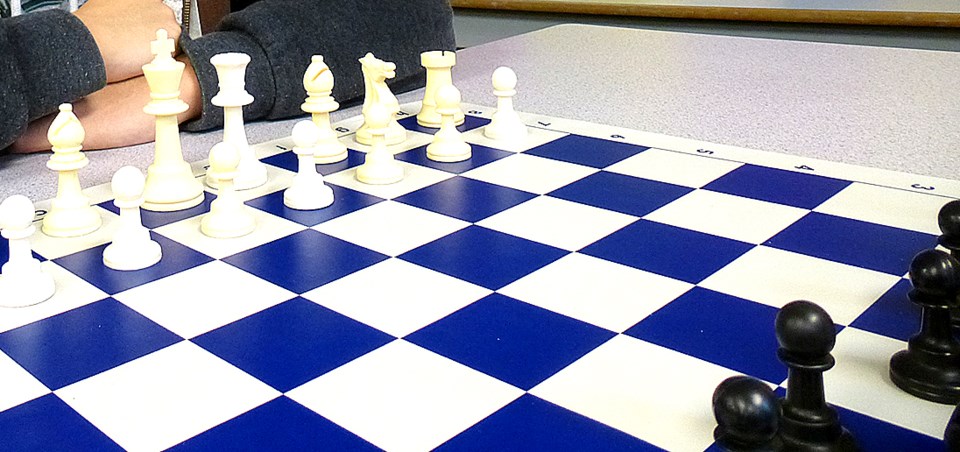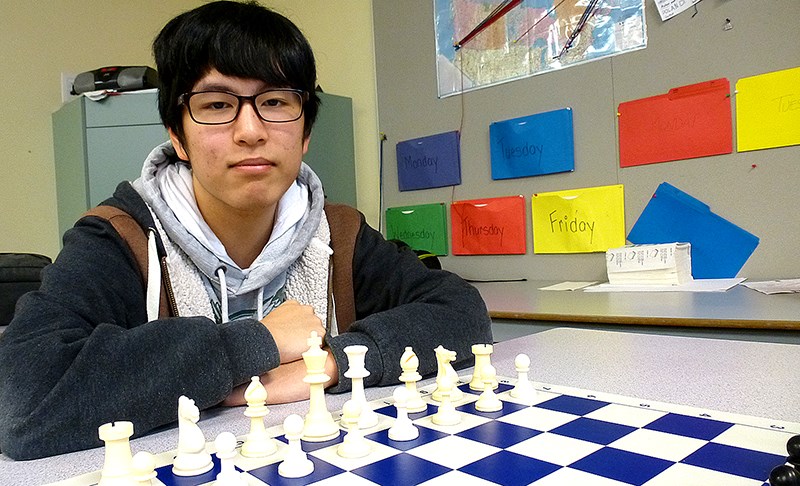A Grade 12 student at Terry Fox secondary is crediting his teachers and his chess class for saving his life and enabling him to take the next step as he prepares to graduate in June.
Aaron Gi is a confident 17-year old with a thick mop of black hair and a ready smile who is finishing off a heavy load of academics and starting a new job at Safeway.
How he got to where he is today is one of those stories that is made for the movies but it happened not far away, but in Port Coquitlam, in a school named for a one-legged runner who is also famous for overcoming challenges.
What PE teacher Brad Peterson remembers of that spring day in 2013 is very little: A class of Grade 9 boys getting ready to play table tennis after some warm-up fitness activities. A commotion around a teen who had collapsed on the floor.
"It's a rare story. It's like a second life — technically a third life — a reason to live on."
Aaron Gi, Terry Fox Grade 12 student
Gi is motionless and not breathing, recalls Peterson, describing a scene out of a first aid manual.
Fortunately, Peterson and fellow teachers John Murphy, Verne Fedoruk and first-aid attendant Casey Kingman had CPR experience and a defibrillator ready at hand.
"We shocked his heart twice… I think it was the scariest thing I've ever experienced," Petersen says.
Finally, the boy's pulse returned and the group continued to administer CPR until paramedics arrived.
But while the school was pleased Gi had pulled through and the dramatic heart incident and the life-saving techniques that saved him became part of the Terry Fox secondary school legend, Gi had another tale to tell.
OPENING MOVES
Aaron Gi's story is one of perseverance through struggle and frustration.
At first, he felt like a fish out of water. The heart incident and three weeks at BC Children's hospital for surgery to get a defibrillator implanted in his chest put him behind.
He struggled with memory loss and remembers not being able to count backwards from eight, an embarrassing after-effect for someone who had always been good at math.
His doctors told him his recovery could take a year, which seemed like a long time to the then 14-year-old.
"I was in a foul mood that semester," Gi says, recalling his first few weeks back at school.
He couldn't play violin anymore because the instrument hurt his chest where the defibrillator for regulating his heart had been implanted.
Physical activity in PE was also out of the question and while everyone was was telling him to take a break, Gi felt stifled and overprotected.
"I didn't feel anything. I felt normal," Gi says, admitting those early days back at school were bleak.
But he wasn't normal.
How many normal 14-year-olds have almost died?
"I really think it's attitude, you have to be able to stare defeat in the eye. You have to think I will be better, not in terms of skill, but in terms of life."
Dejan Radic, Terry Fox chess teacher
How many have almost died twice?

A NEW CHALLENGE
What few knew, and Gi is now ready to share, is that he was born with a hole in a heart blood vessel, a condition that required surgery and that nearly killed him when he was a baby. His family, originally from Korea, including his two sisters and mom and dad, were a great support.
"My parents went through a lot of trouble because of me," Gi says both of the childhood worries and his more recent medical issues here.
But he did his part, too.
With his parents' backing and help from Fox, Gi cast about for something that he could do that would help him regain his lost equilibrium. The new Chess 11 elective jumped out at him as an option.
Now here was something the teen could get involved in and learn, something without physical risk.
"It sounded very intriguing. What kind of school has chess?" Gi remembers thinking.
And although he was only in Grade 10, he got his counsellor to ask teacher Dejan Radic for permission to take the class. Radic, who developed the course for Grade 11s then expanded it for Grade 12s, was more than happy to welcome Gi.
Although he recalls the youth as a frail and withdrawn boy, he believed that chess could help him with problem solving, cognition and critical-thinking skills.
And being younger than everybody else wouldn't be a problem, thought Radic, because Gi already knew the basics of the game and the class welcomes all kinds and abilities.
"You have all types of kids in the classroom and they are all equal," he says.
But like anything new, it takes time to learn the ropes.
Gi remembers being good at chess from the start because his dad had taught him to play. Radic tells a different story.
"I wish I could say he had a natural ability," he says. "No, he was as bad as everyone else. But with will, determination and a no-quit attitude, I knew he had the qualities of a chess player."

For Gi, it was a matter of pride.
GAME OF KINGS
Gi wanted to win and knew the best way to beat the odds that were stacked against him was to study the moves, to practise the tactics and to memorize the strategies.
"Tactics, it's still crazy, the tactics," Gi says, rolling his eyes and recalling the tough tests that Radic gave his students to grade them.
But he persevered through two semesters and joined the lunchtime chess club. It was because of chess that Gi believes he regained his mental faculties because success in chess translated into doing well in other subjects.
"Chess is why I do well in English because I can be creative and strategize. Chess is about structuring and that's good for English and math."
Radic says there's more to it.
"I really think it's attitude," he said. "You have to be able to stare defeat in the eye. You have to think 'I will be better,' not in terms of skill but in terms of life."
There are regrets, though.
Gi wishes he gave more credit to the teachers who saved his life on the gym floor — Peterson who was first to take action that fateful day, he says, is the reason he's still alive and functioning well.
And it's only now, after telling his story in several English essays, that Gi realizes he has something to say and, thanks to chess and his full recovery, a reason to say it.
"It's a rare story. It's like a second life — technically, a third life — a reason to live on."
• Aaron Gi will graduate from Terry Fox secondary school in June. In January, he won the Terry Fox Term 1 chess championship. Dejan Radic is now teaching seven blocks of Chess 11 and 12 classes to 210 Terry Fox students and will be teaching chess to international students this summer.



